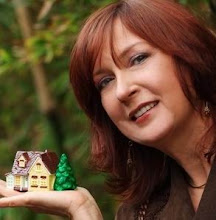NPR is running a great series this month, called "How Green is It?" it's been running during All things Considered, their afternoon news show. I catch it on 88.3
KPCC in the Los
Angeles/
OC area. I just discovered it, and I know August is almost over, but you can go to their website and listen to each episode:
http://www.npr.org/templates/story/story.php?storyId=111519254I was
intrigued by the thought of reusable shopping bags maybe not being a green thing, as they are shipped thousands of miles oversees, and they brought up the fact that people will now have to buy plastic bags to pick up their dog poop, however there are biodegradable plastic dog poop bags also, so all the variables have to be considered.
Here's a summary of the segments:
Green Cars The new "cash for clunkers" law is designed to get Americans to replace old cars with new ones that get better gas mileage. So is it really more environmentally friendly to buy a new hybrid car to replace your perfectly good 5-year-old gasoline-powered vehicle?
Bring Your Own Bags Reusable shopping bags are popping up everywhere — from the grocery store to the home improvement warehouse.
Ikea now charges a bag fee to customers who don't bring their own, and some cities are imposing taxes on plastic bags or banning them altogether. Are these totes as environmentally friendly as they seem?
Green Electricity If your electric company offers you the chance to buy power generated from wind, solar or other types of renewable energy, should you do it? Many utilities offer that option, and as prices have come down, more and more people are signing up. But what are you actually buying?
Energy Star Does that star automatically translate into lower electricity bills and less impact on the planet? Energy Star products are supposed to be 30 percent more efficient than standard products, but some still use a lot of power.
Replacement Windows The federal government will give you a tax credit of up to $1,500 to replace your old, drafty windows with new energy-efficient ones. NPR examines whether your energy savings make up for that energy expenditure, or whether it's better to keep your old windows and make them more energy efficient by adding weather stripping and storm windows.
Bamboo Bamboo is one of the fastest-growing plants on Earth. But how green is it really?
Shogren examines what factors into this equation.
My opinion is you do the best you can. Making small changes will make a big difference. Something as simple as putting your TV, VCR, DVD, etc into a power strip and turning it off when not in use saves a lot of electricity in the long run, as they constantly draw power to enable them to turn on instantly. So we have to wait a minute for the TV to turn on, but we are doing our bit to help, and saving a little on our electric bill. That's what matters to me.
Yes, there are not a lot of green homes....yet, but soon all homes will be in some way or another. As older homes are remodeled, they have better insulation, weatherstripping and energy efficiency and hopefully, some recycled materials are being used too. New homes will be built to more
eco-friendly standards, so it will all be better little by little.
BTW, I have a list of homes under $350K within 10 minutes of the coast in South
OC that are single family, not condos. So, even if you are not able to build green, you can sure save a lot of green on a home or second home to use as a rental or vacation home right now! Just go to my website on the home page for a link to the
flyer: www.ocgreenrealty.com

 And for a green yard, we all should know by now that we should rip up our green lawn and plant native plants (- how about that for a segway. ) A great FREE way to learn about native plant landscaping is to go to the workshop sponsored by one of my fav organizations Back to Natives. It on Sat, August 29, 9AM - 1PM. I love the idea of a free workshop in exchange for planting a garden, this is collaboration at its finest - everyone wins!
And for a green yard, we all should know by now that we should rip up our green lawn and plant native plants (- how about that for a segway. ) A great FREE way to learn about native plant landscaping is to go to the workshop sponsored by one of my fav organizations Back to Natives. It on Sat, August 29, 9AM - 1PM. I love the idea of a free workshop in exchange for planting a garden, this is collaboration at its finest - everyone wins!


